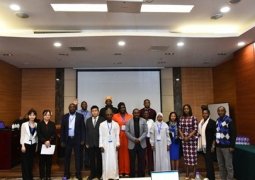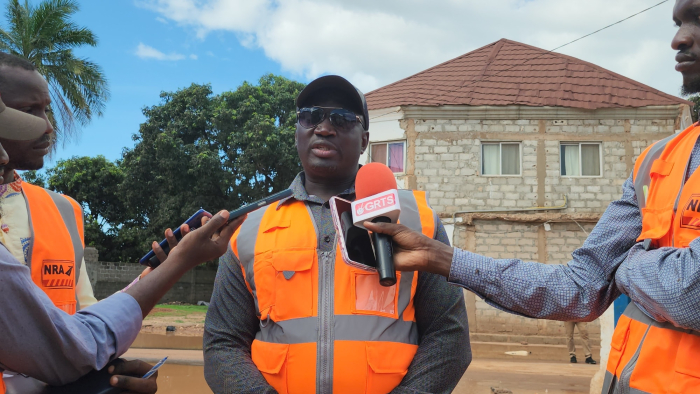
Mr Janneh urged consultants and contractors to take swift action in addressing the recent flooding incidents, emphasising the urgent need to consider the drainage systems. He stressed that every Gambian deserves to live with peace of mind, free from the threat of floods, among others.
Senior NRA engineers, led by the Acting Director, conducted a site visit to Lot 2 of the OIC 50km Urban Flood-Prone Areas. The inspection commenced at P6 – Kololi Tavern through Bijilo to Brufut Road, followed by P20 – Kombo Coastal Road (from Zion Welding Workshop to Wullingkama Car Road), P9 – Sukuta to Wullingkama via Brufut to Ghana Town Road, P7 – Touba Sanchaba Road to Kerr Serign, and finally Sukuta Camping Road.
The government, through the Ministry of Works, Transport and Infrastructure, Janneh added, remains steadfast in addressing perennial flooding across the country while prioritising durable road networks. “We cannot allow seasonal floods to disrupt livelihoods or compromise public infrastructure,” he stated. “Our focus is not just on reaction, but on building with foresight and permanence,” he said.
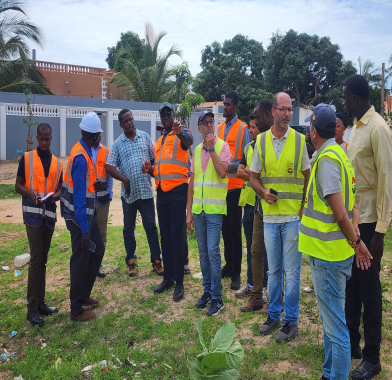
“During our inspection, we identified a number of issues requiring immediate intervention. However, some concerns are more complex and will necessitate a thorough review of the current design and its implementation. These matters will be formally addressed at our office, where we will convene with all consultants and contractors to develop a comprehensive and sustainable action plan,” he told reporters during an interview.
He emphasised the need for contractors and consulting engineers on site to accelerate their flood response efforts and adhere strictly to quality and safety standards, saying: “We will monitor progress closely and ensure that every project reflects the government's vision for sustainable development,” he postulated.
“We are currently conducting evaluations based on reports from communities that were expected to benefit from the newly constructed urban roads. Our team is visiting these areas to assess the condition and investigate the concerns raised, particularly regarding flooding, which many believe is linked to the recent roadworks.”
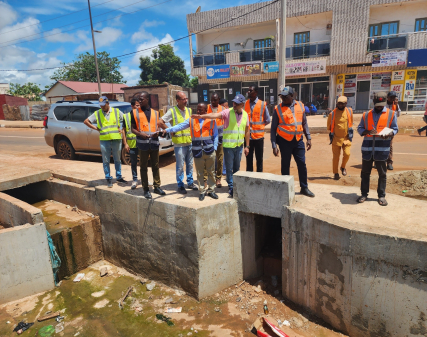
Mr Janneh made his position clear, stating: “We build roads to enhance people’s lives not to worsen them. The aim is to improve living conditions. However, we currently face drainage challenges due to the absence of a proper network to manage and channel stormwater. These are critical considerations the NRA will begin incorporating into our planning. Moving forward, the drainage component will be included from the inception of every new project. We will establish strategic collection points to ensure an effective discharge system that will better serve communities, especially during the rainy season.”
He added: “I can assure the public that, with the continued support of our line ministry, we are fully committed to delivering a comprehensive solution to flooding in the country.”
When asked how soon the issues identified during the site visits would be addressed, Mr Janneh responded: “We’ve issued clear instructions to consultants and contractors, and they are expected to adhere to them in full. The goal is to ensure that flooding becomes a thing of the past. As engineers, we’ll examine the issues holistically and implement necessary solutions.”
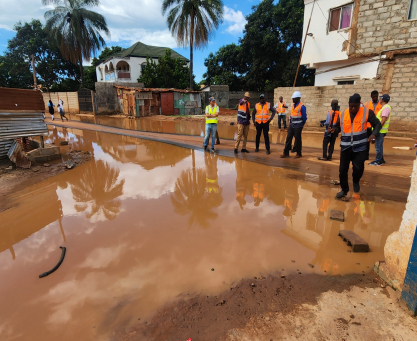
The NRA’s top engineer also highlighted the need for expansion in certain areas to allow water to flow more freely. “We will engage directly with communities and raise awareness around these developments. By working together, we aim to devise lasting solutions that enable residents to live comfortably in their homes without fear of flooding. Our goal is to create roads that serve their purpose while facilitating the safe discharge of water through an effective collection system.”
Mr Janneh also addressed safety concerns, particularly in relation to uncovered drainage systems, stating: “Safety is central to everything we do. We must ensure that lives are protected in every aspect of our operations.”
When asked about the possible causes of the recent flooding incidents, especially in areas with newly constructed roads, the NRA boss explained: “In my view, the issue lies in inadequate discharge. As a hydraulic engineer, I strongly advocate that every road we construct must incorporate systems to capture and manage every single drop of water anticipated in that location. Without a reliable discharge mechanism, we cannot build roads that endure. It is essential to design and implement water passage and discharge systems that either safely contain the water or redirect it to areas where it won’t cause harm.”
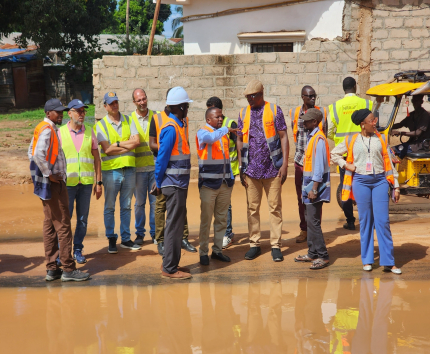
Fathalli Hassine, Resident Engineer for the 50KM Urban Roads Projects covering Lots 1 and 2, emphasised the importance of the site visit, noting that it would pave the way for tangible solutions to the recent flooding issues.
“The roads are not yet complete, and as a result, certain areas may experience flooding. However, we will mobilise all necessary materials and equipment to address the affected locations promptly. I can assure everyone that, through teamwork, all issues highlighted by the NRA will be dealt with immediately.”
Joseph Roymond, a contractor who joined the inspection, echoed this commitment and praised the collaborative efforts underway. “We are working closely with the NRA and consulting engineers to ensure that all concerns are resolved. Admittedly, drainage remains a major challenge in this area, and it will require additional intervention. The communities urgently need a proper drainage network to safely divert water away from their homes.”
During the visit, NRA engineers urged the consultants and contractors to promptly address several issues identified throughout the day, with particular emphasis on those relating to safety and other critical concerns.
Read Other Articles In Headlines




